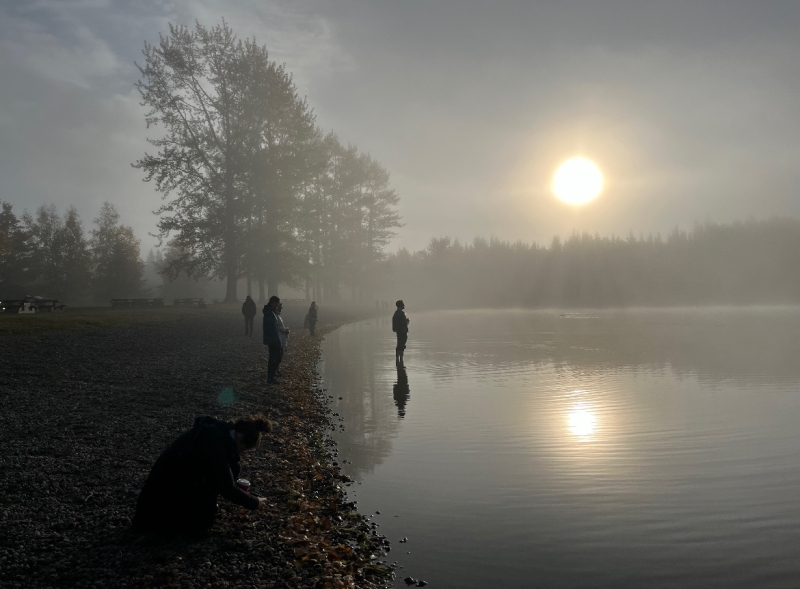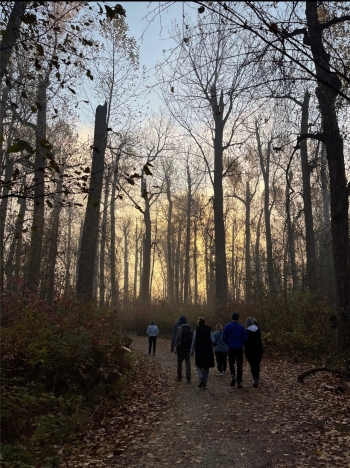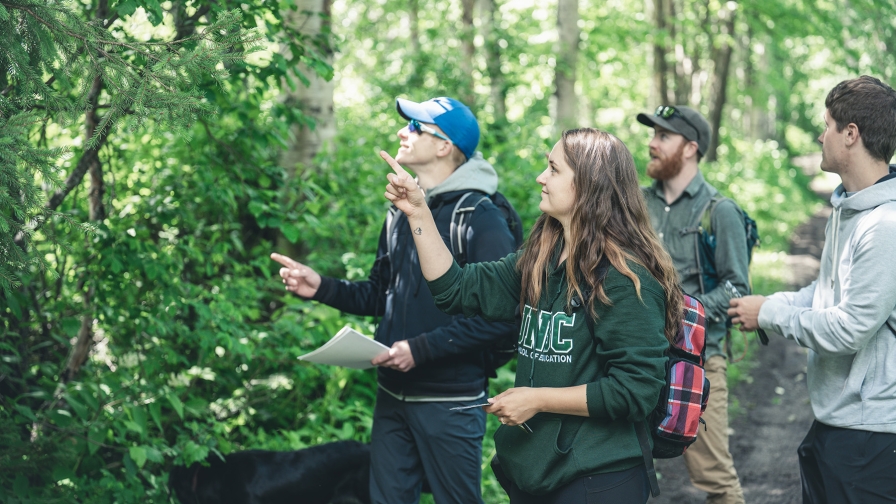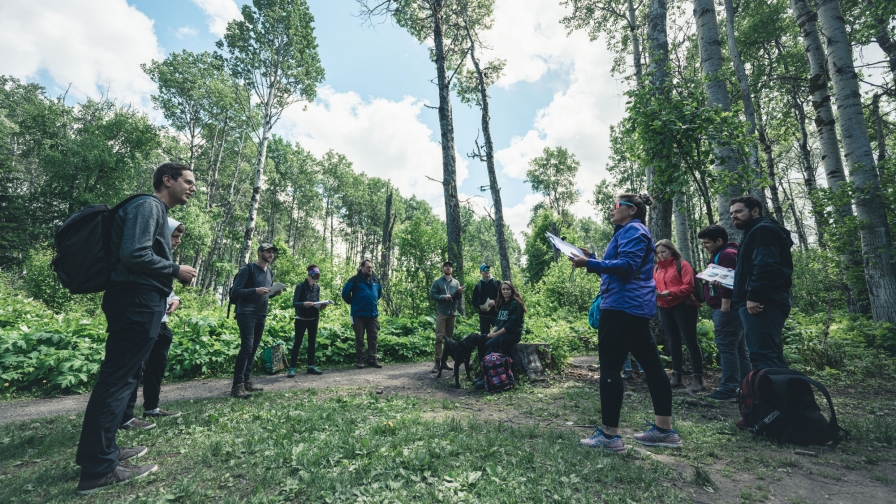Climate Education in Teacher Education

Implementation of Climate Education by UNBC Teacher Candidates: From Theory to Practice
Project description
The world’s climate is changing, affecting numerous aspects of our environment. Moreover, Canada's northern regions are particularly vulnerable to climate change. Research on school education in northern British Columbia (B.C.) has yet to comprehensively consider how teachers approach learning about climate change or even address this complex issue in their practice. A unique demographic of teachers are teacher candidates, pre-service teachers preparing to be certified B.C. teachers. This project aims to explore attitudes and ways of knowing/understanding climate change from the University of Northern British Columbia (UNBC) Teacher Candidates, and then engage and expose UNBC Teacher Candidates to Canadian climate education resources. Specifically, the research question asked in this study is: How are climate education strategies, developed across Canada to support novice teachers teaching climate education to their students, being implemented into practice by UNBC pre-service teachers in northern B.C.? Using an Educational Design-Based Research methodology (Collins, 1992), the project will follow UNBC Teacher Candidates through their first year of teacher education program and then into their early years of practice. The project is focused on northern B.C. school districts and teachers. Key partners include: Institute for Environmental Learning (IEL) and Learning for a Sustainable Future (LSF), each a key stakeholder in developing climate education resources for Canadian teachers.
The study is currently being funded by a Climate Change Education Accelerator Grant. Prior funding has come from UNBC RSIG grants and Pacific Institute for Climate Solutions (PICS) Fast Track Grant. UNBC Research Ethics Board (REB) approved # 6009004.
Climate Education in Teacher Education (CETE) Research question
How are climate education strategies, developed across Canada to support novice teachers teaching climate education to their students, being implemented into practice by UNBC pre-service teachers (Teacher Candidates) in northern B.C.?
Who can participate in the research study?
- Are you a teacher candidate in the UNBC Teacher Education Program?
- Are you interested in or concerned about climate education?
- Are you willing to engage in several activities to learn more about climate education and contribute to the professional development of others?
If you've answered "yes" to all three questions and would like to participate in the CETE study, please read the CETE Information Letter and Consent and take a moment to complete the Pre-Survey. The pre-survey takes approximately 10-20 minutes to complete.
If you do not wish to be a participant, you may still join the CETE workshops as an attendee.
Project timeline and events
CETE Workshop Series - Year 2 - September 2023 to June 2024
We are in the second year of the CETE project and the focus of workshop series in Year 2 is on curriculum development and application of climate change education strategies in K-12 education. Workshops are public and those who are interested are invited to attend.
Please note: if you are a participant in the study, please do not mention that you are a research participant to maintain anonymity.
- Workshop 1 - Interpreting Climate Change: Engaging Through Pedagogy
- October 20, 2023 - 9:00-10:30 AM on Zoom (Provincial Professional Development Day)
- Recorded on October 20, 2023 - Video Recording
- Workshop 1 (Year 2) PowerPoint - Slides
- Miro Slides - Climate Change Education Teaching Strategies Mind Map
- Workshop 2 - From Aims to Means: Climate Education and BC’s Curriculum
- November 24, 2023 - 1:00-2:30 PM on Zoom (School Based Professional Development Day)
- In preparation for Workshop 2, download: WS#2 Front Loading Handout
- Recorded on November 24, 2023 - Video Recording
- Workshop 2 (Year 2) PowerPoint - Y2 WS#2- Slides
- Miro Slides - Workshop 2 - Year 2 - Breakout Groups - Miro
- Workshop 3- Aims and Means to Lesson Planning- Teaching for Climate Action
- January 29, 2024- 1:00-2:30 PM on Zoom - Video Recording
- In support of WS #3- download: 2024_CETE_Y2_WS_3_handout_Jan_29.pdf
- Workshop 3 (Year 2) Powerpoint- 2024_cete_y2_ws3_slides_final_jan29_.pdf
- Workshop 3 (Year 2) Breakout Slides BC K-12 Lesson Planning 2024_cete_y2_ws3_breakout_slides.pdf
Upcoming Workshop Dates:
- Workshop 4 - April 26, 2024 - 1:15-2:45 PM- Register here
Post-Workshop Series Activities
- Post-survey - Implemented in the spring after the four [4] CETE Workshops
- Focus group - Implemented after the Post-Survey
Teacher Candidate Documentation
Artifacts developed by research participants during coursework or practicum relating to CETE are submitted by the participant and collected by the Research Team between during their participation in the CETE research project and teacher education program.
Key work may include: blog posts, portfolio pages, inquiry projects, conference presentations, reflective journals, lesson plans, unit plans, assignments, group presentations, field trips, workshop facilitation, or participation in professional development.
Resources for Climate Change Education
CETE Workshop Series - Year One (Completed in March-May 2023)
- Year 1 - Video 1 - Interpreting Climate Change - March 14, 2023 - Video Recording
- Year 1 - Video 2 - Aims of Climate Education - April 4, 2023 - Video Recording
- Year 1 - Video 3 - Pedagogy Planning for the Classroom - April 21, 2023 - Video Recording
- Year 1 - Video 4 - Evaluating Your Pedagogy - May 19, 2023 - Video Recording
Other Resources
Learning for a Sustainable Future (LSF): Climate Learning
Resources for Rethinking (R4R.ca) - LSF's searchable database of over 400 peer reviewed, curriculum connected climate change classroom resources (lesson plans, videos, books, outdoor activities, games/apps)
Connecting the Dots: 7 interrelated learning strategies for environmental education, citizenship and sustainability
Sample Lesson Plans
The Living World- Ingenium Canada- Shared by Taryn Thiessen
Betsy Jardine Lessons from Cape Breton University sample_climate_change_ed_lesson_plans_betsy_jardine_cbu.pdf
Whirling Swirling Air Pollution- Centre for Science Education- suggested by: Learning for a Sustainable Future
Is it too late to do anything? A BC Climate Change curriculum study- by Conan the Librarian shared by David Litz
Climate Change in the Visual Arts - Art Studio 10- shared by Alexander Lautensach - art10-ccelessonal.pdf
 Project team
Project team
Principal Investigator
Co-Investigators
- Dr. Alexander Lautensach
- Dr. Christine Ho Younghusband
- Dr. David Litz
- Dr. Joanie Crandall
- Glen Thielmann
Research Assistants
Contact information
For more information please email Dr. Hartley Banack at hart.banack@unbc.ca or call
250-960-5317.
If you have any concerns or complaints about your rights as a research participant and/or your experiences while participating in this study, call the Office of Research and Innovation at
250-960-6735 or email reb@unbc.ca.


